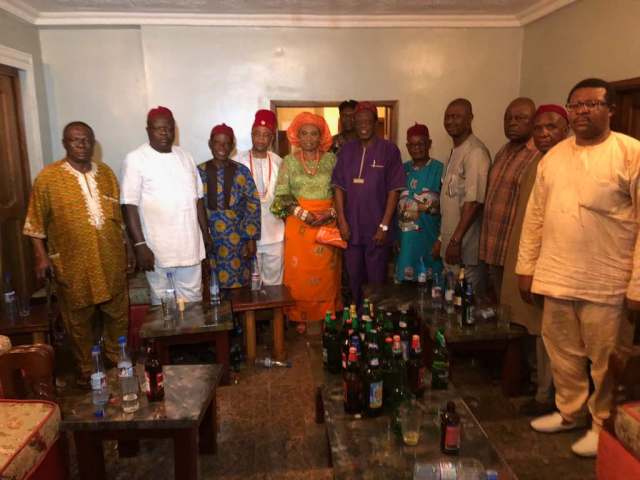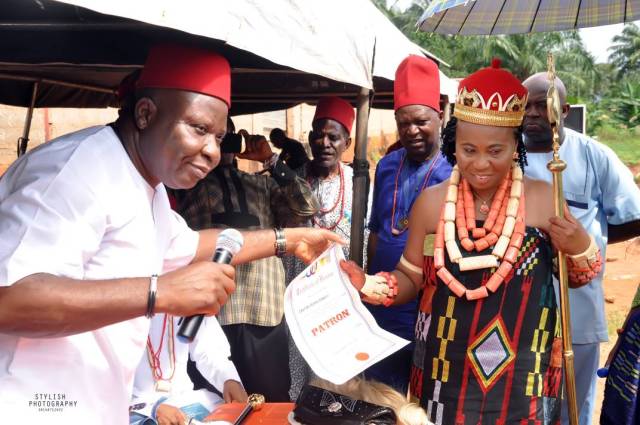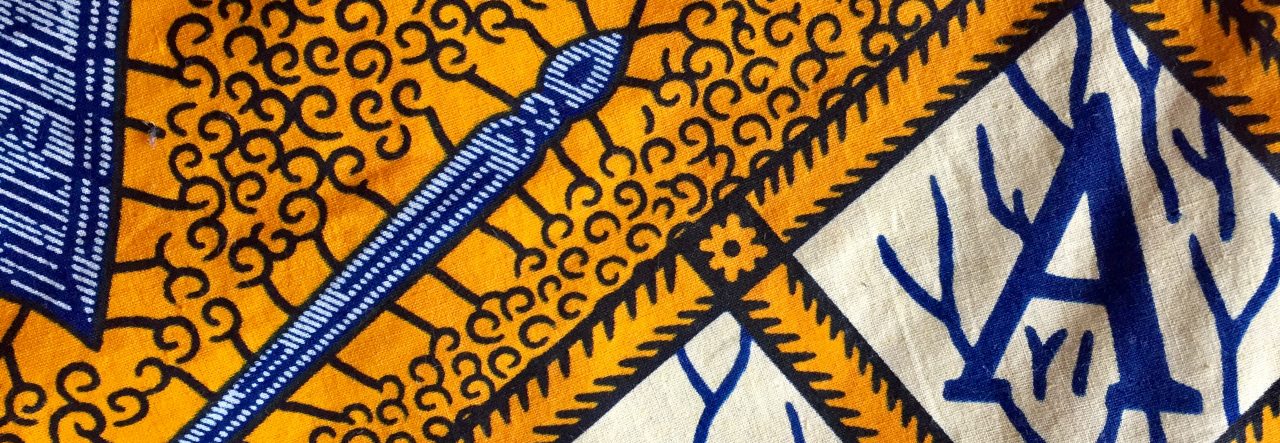By Zibah Nwako
Zibah is a 4th year doctoral researcher at the School of Education, University of Bristol. Drawing from a social justice perspective, her research is a critical participatory study that problematises the wellbeing of female undergraduate students in Nigeria. Addressing this year’s theme of the International Women’s Day on 8th March, ‘Balance for Better’, Zibah’s post reflects on the continuing effects of patriarchy on women from one society in West Africa. Find her on Twitter: @zibahnwako
In April 2018, I received an informal invitation from a female cousin stating that she was being conferred with the title of first female international patron of a certain organisation that was founded in Nigeria, West Africa. I replied with half-hearted congratulations and forgot all about it. When the subject came up again in June in an online family group chat, I was in the process of writing the context chapter of my thesis. The more I wrote about the influence of patriarchy on lived experiences of female students, the more this invitation piqued my interest and I decided to conduct a little research on the said organisation. My initial findings were that it had been established in the year 1971 and although membership was open to women, none of the patrons was female – in my view, a veritable ‘old boys’ club’. I therefore accepted the invitation to attend the event for two reasons – to support my cousin in her conferment, and as a gender professional with my researcher cap on.
The Traditional Face of Patriarchy
Some background information – my cousin is a learned, successful medical doctor who runs two General Practices in England. She is a mother to four young children and is the ADA[1] (eldest daughter) of her parents with seven siblings. A respected member in her religious community, the Catholic Church, she is very much involved in charitable works both in the United Kingdom and Nigeria. She also holds the traditional title of ‘Oduenyi’, translated as ‘the Elephant’s Tusk or Ivory’ (Okere, 1996), a symbol of ‘great strength’ in Igbo land (see footnote 1). I would describe her as having a strong personality with well-honed leadership skills. Attaining this position therefore, was well deserved albeit not without opposition, as I later discovered, from the ‘powers that be’ i.e. some of the men who had overseen the group since its inception 47 years ago. It was clear to me that this struggle for control stemmed from the patriarchal nature of the organisation and its members.

According to the English Oxford Living Dictionary, one of the definitions of the term patriarchy is ‘a system of society or government in which men hold the power and women are largely excluded from it’ (Oxford University Press, 2018: online); in this case, an institutional system. This organisation describes itself as a non-profit, non-political, social and philanthropic body whose membership is open to everyone regardless of tribe, religion or race. It has a current total of 42 branches in Nigeria, the United Kingdom, Canada and the United States of America. That said, I observed from their literature that the organisation’s membership is mainly male. One member stated that their motto of unity, love and service is founded in their principle of ‘be your brother’s keeper’ [italics mine – highlighting that ‘brother’ is a gendered word]. I also noticed that most of the women photographed at the group’s events were tagged as members’ wives. During the 2-day conferment event, all the group members in attendance were male, which begs the question: where are the female members of the organisation?
Another factor noted was that although open to everyone, most of the members are from the Igbo tribe of Nigeria (see footnote 1). Perhaps this is because the organisation was founded by an Igbo man soon after the Biafran war[2] in Southeast Nigeria which lasted from the years 1967 to 1970. I assume that for this same reason, the activities surrounding the conferment took on a traditional slant. For example, the event was held in our village and as the title-holder Oduenyi, this meant that numerous courtesy visits were made to the local and traditional rulers such as the ‘Igwe’ (King of the village) to formally invite them for the event. We also visited the men and women family groups (known as ‘Umunna’ and ‘Umuada’[3] respectively) of both parents of the conferred. On each visit, traditional gifts presented to the individuals and groups including a cow, bags of rice, tubers of yams, kolanuts, and gallons of palm wine.
The Ceremony
To my amazement, the 2-day event turned out to be a big, expensive affair. The first day consisted of lengthy closed-door sessions between the patrons and members of the organisation. I observed that soon after one all-male group left, another arrived. My cousin later explained that whilst the second group comprised of the president of the club and chairmen of the various branches,
‘…the first group was mixed with both the break-away faction and the official main group but they were mostly the patrons of the club… also highlighting the turmoil and division going on in the club at the time of my installation. Each faction of the club was competing to be the one officiating at the ceremony. I had to be seen to be neutral at all times.’
Nevertheless, the investiture was performed in one of the private sessions, with the formal certificate presented the next day (see next photo).
On day 2, the ceremony commenced with a Catholic mass, followed by a grand and colourful celebration attended by dignitaries and villagers alike. It was a rich mix of traditional attires, cultural dance troupes, decorative banners, live music bands, and vast amounts of drinks and food. The event was also publicised and reported on the local radio and television channels.

Her Struggle
The event brochure was filled with pictures and congratulatory messages from family, friends, well-wishers and members of the organisation to the first female patron. Like the phrase ‘be your brother’s keeper’, the term ‘patron’ is another gender signifier, and I wondered if a title such as ‘patroness’ or ‘matron’ would not be more appropriate. In any case, I realised that the honour was not accorded to her without a struggle and therefore the more pertinent question was: how and when was the decision taken to confer the patronship on an already accomplished, successful woman in her profession, home and community? I found one answer in the pages of the brochure, from the President of the organisation’s branch in London –
‘Congratulations on your installation as a patron of our prestigious club… as the first woman in the history of the club to attain such a position. You had a pipe dream that became a burning ambition. You stood your ground. You remained focused and fought for it, clawing away giant obstacles till the end. And what a result. You must feel good that you achieved your goal and very proud that in doing you have created a record… I feel optimistic as you rise in status within the hierarchy that the club will henceforth experience greater progress and monumental prosperity.’

The Other Women
During our interview after the event, I asked more questions such as: ‘Are you the only female member of the Club?’ and ‘Where are the other women?’ From her answers, our discussion extended to the seemingly implicit role of women as promoters of patriarchy (I have written another piece about this). In the meantime, her advice to women is:
‘…to be the best that one could be in whatever they are doing in life. They will be noticed soon enough. Also, if you volunteer to do something, perform that duty as if you are doing a paid job, i.e. with passion and dedication. You will stand out in the crowd. Thirdly, no doors are permanently shut/closed. Continue to knock until it is opened for you, in other words, persistence always pays off in the end.’
As for patriarchy – still alive and kicking – this woman took on the challenge, battled for herself and the other seemingly faceless and voiceless women in the organisation and paid a handsome price. In a sense, she fought and won!
So now in 2019, in response to balance for better, I say:
A LUTA CONTINUA… THE STRUGGLE CONTINUES!!!
[1] ADA is usually a traditional name given to the first female child in a family from Igbo land, an area in the Southeast of Nigeria. The Igbos are one of the 3 main tribes in the country.
[2] Also known as the Nigerian Civil War. More about it here: https://blackpast.org/gah/nigerian-civil-war-1967-1970
[3] Considered as the most important decision-making group in the Igbo family and society, the ‘Umunna’ is a hierarchy of patrilineages, i.e. the male line of descent from a founding ancestor (Akakuru et al., 2014).
‘Umuada’ is a forum for ‘all daughters of a particular clan, village, town or state… designed to present and protect their interests’ (Michael Vincent, downloaded from https://www.academia.edu/4733270/Umuada on 27th November 2018).

In the meantime, her advice to women is:
‘…to be the best that one could be in whatever they are doing in life’
_____________________
I think this blog post is fascinating, not only because the author’s observations are really engaging, but also the post illustrates instances where the celebration of a female leader is also a reminder that in some cultures, just to be included in certain societies, women have to be the best ones among everyone (in comparison to both their male and female counterparts).
Thank you for the thought-provoking blog post, Zibah.
LikeLike
Thanks for your kind comments, Trang! Yes, contextual and cultural applicability (and nuances) are certainly important, and should be taken into consideration with gender issues.
LikeLiked by 1 person
Nice one Zibah.
LikeLike
Many thanks, Jane.
LikeLike
Very interesting insight… Thanks for sharing!
LikeLike
Thank you very much, Shawanda. Glad you enjoyed the piece!
LikeLike
This is a great message for us women… Well all people really… To keep trying and be at it as no dreams are away from reality…
Very inspirational Zibah! Kudos to you!
LikeLike
So true, Shimmi – ‘…no dreams are away from reality’. Thank you for engaging!
LikeLike
You nailed it . You put into words the same questions, concerns and bewilderment I felt about her being the only female
Well done. I look forward to reading more articles from you.
LikeLike
Zibah, thank you. This is so well written and makes me realise how I could be a silent accomplice to the entrenchment of male domination in Igboland.
I suppose that being born and grown within this system makes me numb to how sexist and dehumanizing this system can be on women.
So thanks for this blog because it raises questions about things which I have accepted, before now, as part of my culture. Culture evolves but Igbo male domination is institutionalised. You have sensitized me…now WATCH THIS GIRL.
LikeLike
Indeed, Nnennaya… and these are the concerns and fears that women need to face up to (and get past), in order to change the status quo. As she did! Thank you for adding to the discourse.
LikeLike